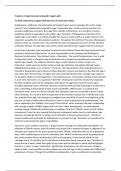‘Cassio is a tragic innocent ensnared in Iago’s plot’.
To what extent do you agree with this view of Cassio (25 marks).
Shakespeare’s deliberate characterisation of Michael Cassio seems to position him as the ‘tragic
innocent’ who is deliberately targeted by Iago’s malevolent plan. Cassio’s primary function is to
provide a deliberate contrast to the tragic hero, Othello. Furthermore, as a construct, Cassio is
positioned directly in opposition to the villain, Iago. Therefore, if Shakespeare’s intention is the
exploit Iago as the villain, it is entirely feasible that Cassio is constructed as a ‘tragic innocent’ who
engenders sympathy from the Jacobean audience. Throughout the entirety of the play, Shakespeare
portrays Cassio as a ‘proper man’ who worships the play’s protagonist and yearns for the attention
of Othello. Perhaps, his only fault is his naivety, which would therefore suggest that he is innocent.
At the start of the play, Iago articulates his grievance that Michael Cassio has been promoted to the
position of Lieutenant ahead of him. He uses fragmentation in his exchange with Roderigo to
illustrate his discontent, ‘One Michael Cassio, a Florentine’. The use of the determiner ‘one’ is used
to show that Cassio is a target to Iago and therefore he is targeted and positioned in opposition
against Iago. Equally, the audience witnesses Iago’s condemnation of Cassio’s origins as a
‘Florentine’, which seems to further reinforce that Iago victimises and exploits Michael Cassio,
highlighting his position as an ‘innocent’. Moreover, the fragmentation of the adjectival phrase ‘a
Florentine’ perpetuates Iago’s hatred of ethnic diversity in Venice and alludes to the idea that Iago’s
plan stems from the fact that a foreigner has been promoted ahead of him. Notably, Iago captures
his thoughts within the end-stopped line, ‘One Michael Cassio, a Florentine, A fellow almost damned
in a fair wife, that never set a squadron in the field’. Shakespeare uses this structure to emphasise
the plain-speaking nature of the antagonist and capture his aggression towards Cassio. Iago’s
thoughts regarding Cassio’s ethnicity cannot be contained easily and this leads Iago to orchestrate a
plan, culminating in the downfall of both Cassio and Othello. Whilst Cassio, in a physical and
emotional sense, serves as a foil for Othello, their characters seem to run parallel in terms of their
ethnic diversity. As a result of their transgression of the Venetian societal norm, Othello and Cassio
face prejudice from Iago, who attempts to instigate their downfalls. From the very beginning of the
play, the concept of multi-cultural diversity in Venice is both emphasised and problematised. This
idea is explored by Eric Griffiths, in his novel ‘If Not Critical’, which evaluates the play’s relationship
with revenge tragedy. Griffiths argues that if we view ‘ethnic homogeneity’ as a stereotypical
revenge tragedy, Othello, like Hamlet, gives us nothing of the kind. ‘Othello’ seems to lack ‘ethical
transparency’ from the very moment that the play’s antagonist makes clear his motivations. Iago
expresses to Roderigo that he is ‘acting out of frustration at Cassio’s advancement’. Therefore,
Cassio is deliberately portrayed, by Shakespeare, as a target for Iago. Therefore, he is positioned as
‘innocent’ and ensnared by Iago’s cruel plotting.
Moreover, Cassio could be viewed as a ‘tragic innocent’ through his relationship with Othello. His
adulation of Othello impacts upon his actions and causes him to experience lapses in judgement. His
adoration and respect for the play’s eponymous hero, Othello, motivations him to act in desperate
ways, which enables Iago to enact his malevolent plan. Whilst, he behaves poorly by getting drunk,
this cannot position him as anything but foolish and misguided. Cassio himself admits he has
‘unhappy brains’ for drinking, but he still choses to drink after being coerced by Iago. Therefore, it
seems that he is weak, rather than guilty of any crime and his attempts to refuse alcohol highlight
that he is a ‘pawn’ in Iago’s masterplan. Significantly, Shakespeare uses the character of Iago to
expose Cassio’s worst qualities and the audience can see that Iago is able to expose the frailties and
weaknesses of Cassio. Through this antithetical juxtaposition, Cassio is positioned as vulnerable,




